Inside look at Ghana Chess









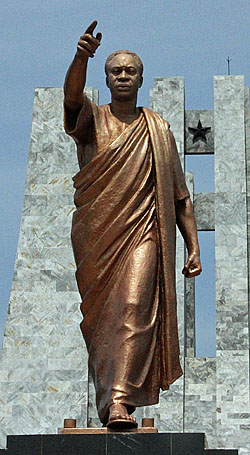

Dr. Kwame Nkrumah
Ghana is a place that many decide to choose for their initial visit to Africa. The reasons are many, but typically Ghana has an intricate blend of qualities that make it a very lovable place… the energy and happiness of the people are perhaps the most noted. Ghana is also a very important country on the African continent. It was one of the first countries to fight vigorously for self-rule and throw off the yoke of British domination. It became independent on March 6, 1957.
This effort was led by Dr. Kwame Nkrumah, a man whose works I had reviewed deeply in my doctoral studies. His “Africa Must Unite” text is an ode to Africans’ ability to assert themselves politically, socially, and economically and to join the other nations and equals. It was a bold statement and perhaps one ahead of its time, but one that has gained a greater currency in retrospect.
I took my third trip to Ghana. All have been related to some academic matter. I conducted Ph.D. research in Ghana while looking at how Internet Commerce could help aid sub-regional trade in the ECOWAS region. Ghana was vibrant, the citizens were embracing the new technology with gusto and you could see the fortunes were about to change.
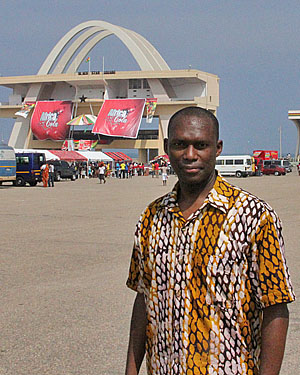

Independence Square in Accra, Ghana.
I returned two years ago on a visit with other educators and was able to see a bit more of the vibrant electricity of the people. It only confirmed my kinship with Ghana and Ghanaians. I reported on my trip on these pages. However, I did not meet any chess players after constant attempts. That had to be the low point of a fascinating trip.
This time it would be different. I had met Ghanaian players in 2008 during the Chess Olympiad in Dresden, Germany. They were easy to spot in their bright-colored shirts and equally bright smiles. During my reunion with Ghanaian players at the 2012 Chess Olympiad in Istanbul, Turkey, again I met the national team. In addition to reuniting with John Hasford and Edward Lamptey Thompson, I met Kwadwo Bonsu with whom I kept in contact over the past year on Facebook. It was he who began to put the word out that I was coming to Ghana.
.jpg)
Edward Lamptey Thompson and John Hasford at the 2008 Chess Olympiad.
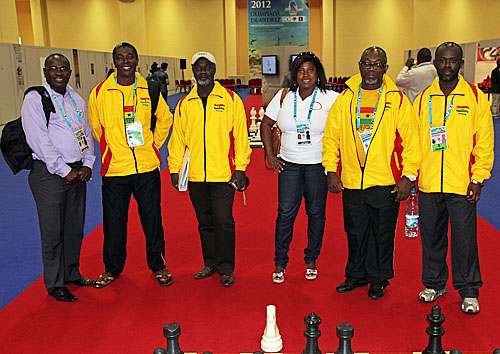

Ghana delegation at 2012 Chess Olympiad. From left to right: George Arko-Dadzie (President), Kwadwo Bonsu, Francis Andanquah, Christiana Naa Merley Ashley (Delegate), Evans Mawuko Kpodo and Kojo Hasford. Not pictured was Edward Nii Lamptey Thompson.
After arriving in Ghana and spending several days attending meetings and touring Accra, I was told by Kwadwo that there would be a tournament held and that the president would contact me. Sure enough, George Arko-Dadzie called and left a message with my host. We were staying at the University of Ghana at Legon. A few days later, the president stopped by the campus and happened to find me outside socializing with my travel mates. He confirmed the tournament and we scheduled a pick-up time.
George had been the president since 2009 and later stated in an interview that there were about 200 players nationwide. However, on this Saturday afternoon, I would meet most of Ghana’s “top brass”. He picked me and we collected Kwadwo along the way. I told Kwadwo, “We finally meet in Ghana.” We headed toward “Robi’s Dutch Pub,” a place that Ghanaians frequent to play off-hand chess games. On cue, several players had already assembled and were gripped in blitz battles, a common site in any chess nation.
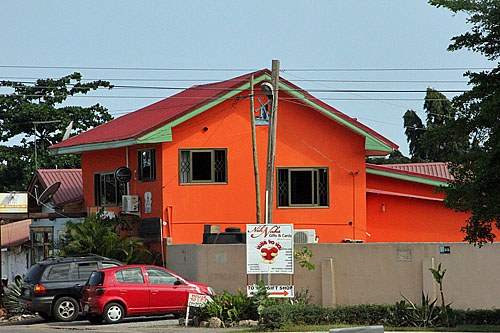

Robi’s Dutch pub where Ghanaian players play.
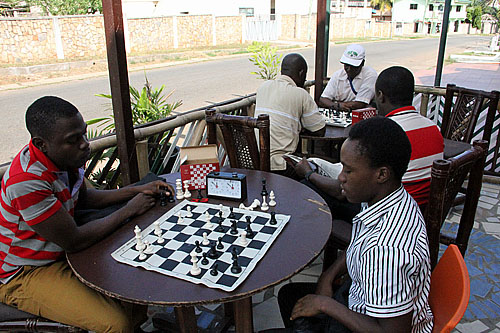

Blitz Battles!!
We then assembled upstairs and tables had already been prepared for the tournament. The president conducted an opening ceremony and graciously introduced me to the players. He mentioned that most of the top players of Ghana were present except Francis Andanquah, the defending champion.
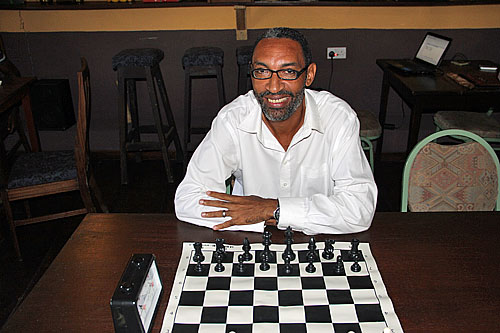

Dr. Sekou Nkrumah is the son of the late Dr. Kwame Nkrumah. He is the namesake of Sekou Toure’, Guinea’s first president and the man who made Dr. Nkrumah co-president after he was deposed. He certainly inherited his father’s charisma. 🙂
The tournament was to be a rapid time of 15 minutes per side and six rounds. I intended to monitor the top board. After a few rounds, it was clear to me that Kojo Hasford would be the man to beat. His play appeared to be in good form seeing how he had dismantled his first three opponents so effortlessly. However Edward Thompson and Kwadwo Bonsu were also battling for honors. Unfortunately, Thompson was upset by Richard Gabah in a very entertaining slugfest. That left Hasford and Bonsu set for a last-round battle with 4.5/5.
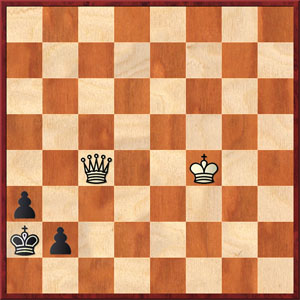

There was also a very intriguing ending on one of the lower boards. This game featured a good knight versus a bad bishop but then transformed into a pawn ending. White, a pawn down, somehow queens first, but black gets two pawns rolling. The queen was unable to stop the pawns, but it was still a book draw. However, black made a horrible blunder!! What a roller coaster!
Now for the finale’! Out of a Queen’s Gambit Declined, Bonsu-Hasford built up slowly in a positional struggle with intricate piece play. Bonsu went on a tour with his king’s knight… f3-e5-d3-e5-f3-d2-b3-a1-c2-b4-a6-c5-e4. While the major pieces were still on the boards, so were the pawns. This made it difficult for either side to gain momentum. So, Hasford decided to make a move. The gallivanting knight I mentioned? Watch the game!
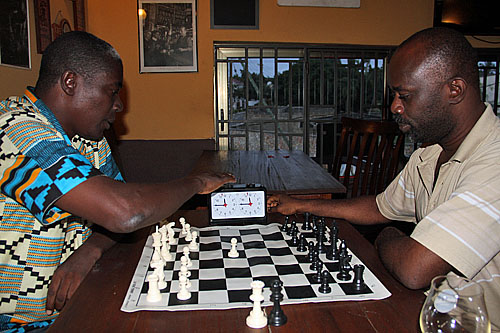

Finale’… Kwadwo vs. Kojo, 1/2-1/2.
So Hasford’s sacrifice of an exchange for play on white’s weakened light squares was a good, practical choice, but he missed 57…c5! with chances. However, both players got into a time scramble and by that time, the advantage slipped away. Bonsu offered a draw and Hasford agreed. They split first place, but Hasford had better tiebreaks. Well done! Each player got a Wilbert Paige Memorial commemorative booklet and the both Hasford and Bonsu got Chess Drum t-shirts.


Winners… Kwadwo Bonsu and Kojo Hasford. Incidentally, both names are pronounced the same. Also pictured is Carlton Hushie, the young upstart.


After the rapid tournament, there was an impromptu blitz tournament in which most of the rapid participants played. Mawuko Evans and myself were added. The six-round tournament was won by Hasford with 5/6 managing to lose our individual encounter. However, it didn’t help my case as I had hallucinated against Hushie. After sacrificing a queen for a bishop on d7, I plan to fork on f6 after Qxd7. Problem… my knight was on d4. I also lost to Thompson and ended on third with 4/6. Disappointing, but at least I got a chance to play chess in Ghana.
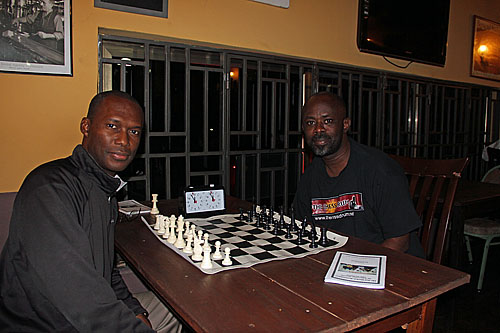

Me with Kojo Hasford in the last round of blitz tournament.
All in all, it was a good day and I was able to secure an interview with the president afterward. He discussed among other things, the beginnings of chess in Ghana, its current progress, and plans for expansion. Ghana is yet another country seeking a Chess-in-Schools model. Here is the complete interview…
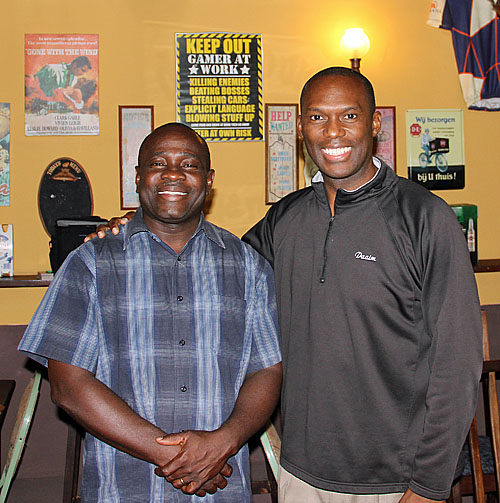

Me with George Arko-Dadzie, President of Chess Association.
Photos by Daaim Shabazz.
Let us hope that Ghana as well as many developing federations get the support they need both locally and through FIDE initiatives to develop chess. Apart from that, Ghana is a wonderful country full of promise, one with such as prideful history and a place where the warm sun welcomes its friends and guests.

THE HISTORY OF GHANA CHESS
The history of Chess in Ghana dates far back as the 1970s when a group of diplomats and enthusiasts came together to form the Accra Chess Club; a subset of the Attoh-Quashie Sporting Club at Swalaba. The pioneers of the game included Mr. Asmah, Mr. Djaisie, Mr. Carl August, Mr. Hammond, Mr. Graves-Edu, Dr Oracca-Tetteh, Mr. Quao, Mr. Ferdinand Botchway and Mr. Kofi Busumtwi. This club was sustained by the group and culminated into the formation of the Ghana Chess Federation (GCF) and chaired by Mr. Asmah.
The GCF became affiliated with the World Chess Federation (FIDE; from its French acronym Federation Internationale des Echecs) in 1984. Thereafter, the game caught up with students and lecturers of the University of Ghana, University of Science and Technology and the University Of Ghana Medical School.
The craving by the students and doctors unearthed great players such as; Mr. Gaskin, Mr. Oliver Vanderpuye, Mr. Richard Fosu, Dr. Odoi, Dr. Kyei-Mensah, Dr. Brobbey, Dr. Philips, Dr. Adubofuor, and Dr Imbeah. Meanwhile, the chess playing body was encouraged to form local chess clubs in their communities.
Clubs that sprang up included the Mamprobi, Dansoman, Circle, Tema and Labadi Chess Clubs with great talents in the likes of Mr. Emmanuel Otoo, Mr. Aaron Mills-Pappoe, Mr. Danny Odamettey, Mr. Owuadey Macheen, Mr. Samir Mouthiseb coming out.
Each calendar year had seen several monthly open championships organized with the top ten or twelve players put together to challenge themselves for the national title in a round-robin tournament. Past national champions are:
Ghana has taken part in two World Chess Olympiads.
In 1986, Mr. Fredrick Asmah, Mr. Francis Anquandah, Mr. Kofi Busumtwi, Mr. Neville Barnes, Mr. Lloyd Ankrah (captain), and Mr. Graves-Edu represented Ghana at the Chess Olympiad in Dubai, while Mr. Edward Thompson (captain), Mr. Kojo Hasford, Mr. Robert Sackey, and Mr. Kees Hoogendjik did same at the Dresden Olympiad, Germany, in 2008.
The National Sports Council (NSC) has always been our backbone as far as the administration of the game in the country is concerned. The status of the GCF was changed from a federation to an association by the NSC with a secretary-general attached to the discipline. The Secretary-General serves as the administrative link between the association’s executive body and that of the NSC. Chairmen (c) and vice-chairmen (vc) of the association till date include:
Sponsorship for tournaments has been a bane to the organization and promotion of the game. Yet one cannot miss out individual attempts made by a number of personalities in promoting the game. It is therefore worth recognizing the gestures from Mr. Eddie Blay, who hosted the chess playing body at his residence to open tournaments dubbed the “II Corsario”Open Championships; Mr. Samir Mouthiseb, who also organized invitational tournaments at his residence at South Labadi with good publicity in the dailies; Mr. Lloyd Ankrah who independently sponsored a number of invitational and open championships as well as Mr. Charles Kweku Hammond of Johnnie Walker Limited, who sponsored a number of tournaments in the recent past.
Link: https://www.sportscouncil.com.gh/maincat_select_discipline.cfm?disciplineID=7
Note: This data is a tad bit dated. Mr. Kojo Hasford was crowned national champion in 2012 while Mr. Francis Anquandah reclaimed the title in 2013. Ghana also participated in the 2012 Olympiad in Istanbul, Turkey. George Arko-Dadzie has been the President since 2009.
Many thanks for the report.
Comprehensive reporting! The best!
Thanks brother! I hope to put Ghana and its chess community in a positive light. Jonathan Corbblah is talking about playing for Ghana, his father’s birthplace. 🙂
Corbblah would be an interesting addition to Ghanaian team as he is an interesting individual with gigantic talent. Whether it is Ghana, Jamaica, Trinidad or any of the other African countries, when they advance, I think it will have a positive effect on our players here as well.
Thanks Daaim for the historical referencing. I felt like I enjoyed this piece and blog almost as much as you (impossible of course..:=)!! ).
Kimani A. Stancil
No… I believe you! It is possible.
I was chairman of Ghana chess from 1995 to 1997 with George arko dadzie as my vc. The main problem with Ghana chess is that the same players from the early 1980’s still dominate both the game and the admin. I came into the admin with a lot of enthusiasm and resources but was hounded out by a click who felt side stepped. I feel sad for Ghana chess because anytime I read about it, its still the same names from the 1980’s that feature.
I have enjoyed your article
I remember mr alhassan yakubu’s term as chess president. very active
I have a 7 year old daughter whom I would love to introduce to chess. Any plans for a children’s club?
Good write up, Sir. Lovely history about Ghana Chess.
Missing in the list from the medical students and doctors is Dr. Carl August, the joint National champion in 1981 with Dr. Odoi.
Cheers!